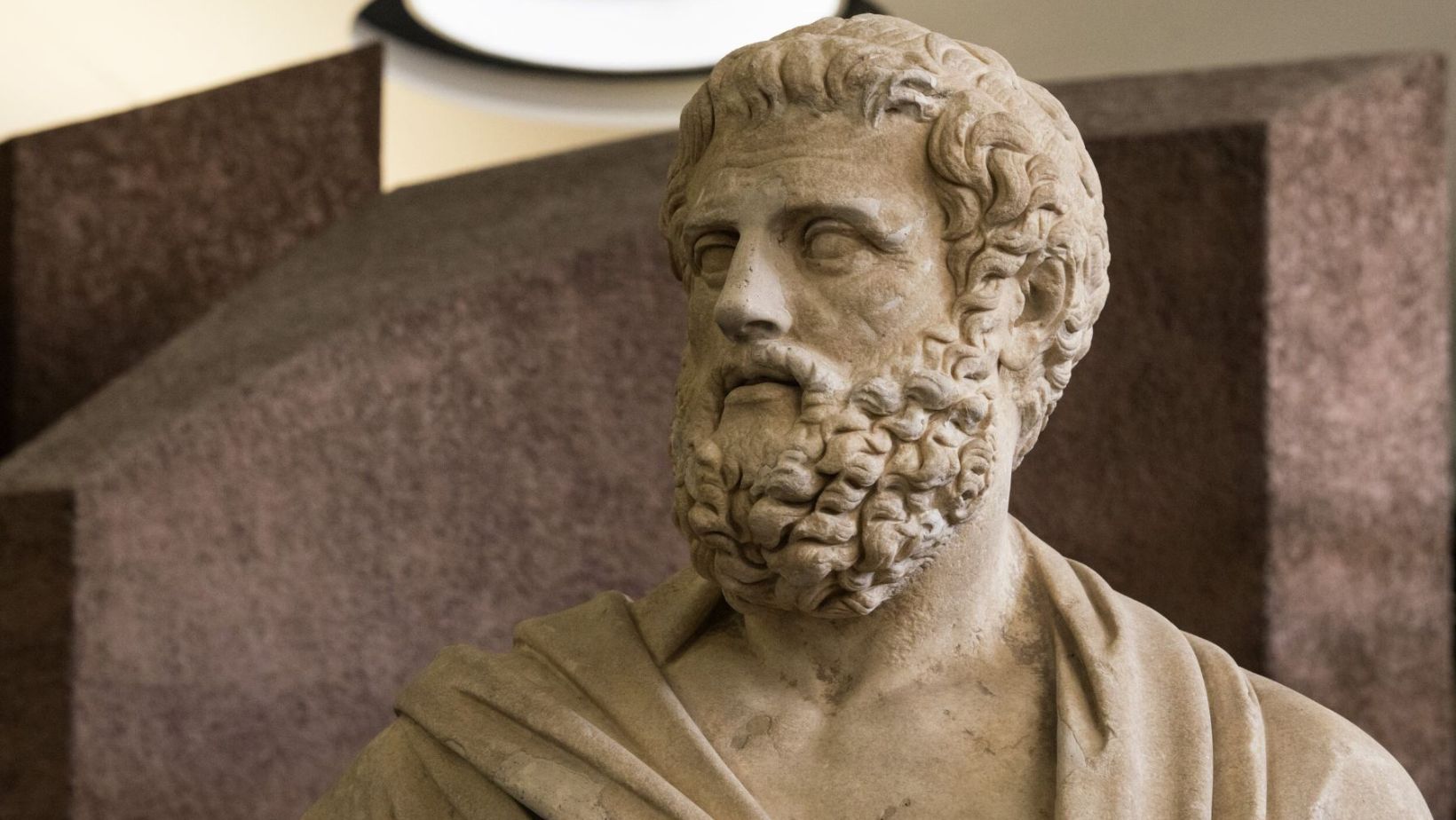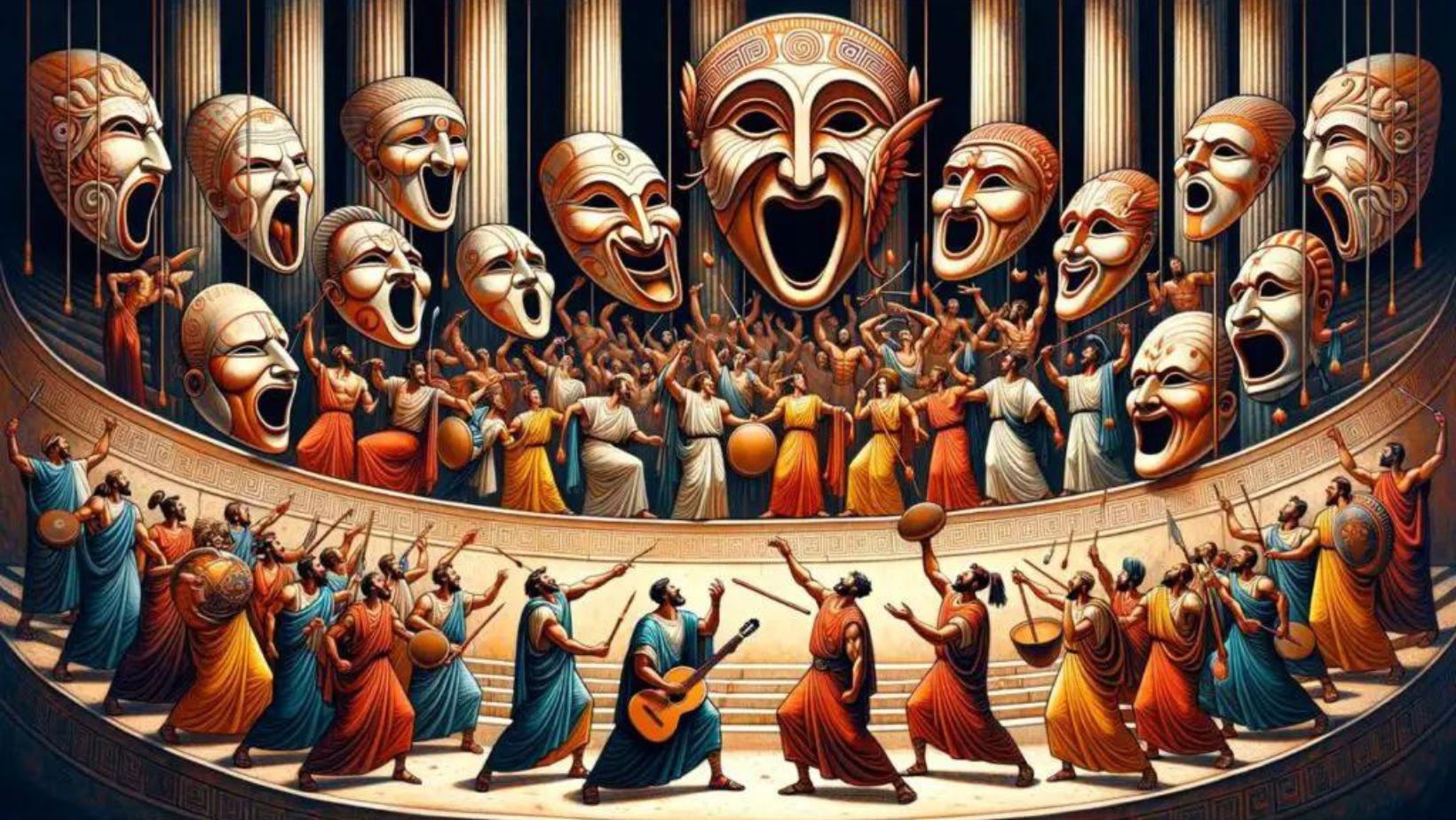When we talk about legends who’ve left a mark so deep that their stories echo through millennia, Sophocles’ Legacy stands tall among them. With over 120 plays under his belt and a life dedicated to creating and transforming Greek theatre, he’s more than just a historical figure; he’s an immortal beacon of storytelling prowess. Born into the cradle of civilization itself—ancient Greece—Sophocles’ works have transcended time, shaping narratives and inspiring generations long after the curtains closed on his era.
But what makes Sophocles’ legacy so enduring? Is it merely the tragic depths of “Oedipus Rex” or is there something more profound at play? Let’s peel back layers of history to uncover how this playwright continues to inspire and challenge us centuries later.
Table of Contents:
- Sophocles: One of the Greatest Greek Tragedians
- The Theban Plays: Sophocles’ Most Famous Works
- Sophocles’ Influence on Literature and Beyond
- Sophocles’ Contributions to Greek Theatre
- Exploring the Depth of Sophocles’ Characters
- Conclusion
Sophocles: One of the Greatest Greek Tragedians

Sophocles was a master of his craft, a true legend in ancient Greek drama. Born around 496 BCE in Colonus, near Athens, he lived a long and fruitful life, leaving behind a legacy that would inspire future generations.
Early Life and Career
From a young age, Sophocles showed a keen interest in the arts. He received a well-rounded education and even led the chorus of boys at the celebration of the Greek victory over the Persians at Salamis. But it was in the realm of Greek tragedy where he truly shone.
Sophocles began his career as a playwright in 468 BCE, competing against the great Aeschylus. And guess what? He won. This was just the beginning of a long and successful career over 60 years.
Innovations in Greek Theatre: Sophocles’ Legacy
Sophocles really shook things up in Greek drama, blazing trails left and right. When he brought the third actor onto the stage, it was like opening a door to new twists in conversation and deeper dives into who these characters really are. He also increased the size of the chorus from 12 to 15 members and introduced painted scenery to enhance the visual experience for the audience.
These innovations may seem small, but they had a huge impact on the development of Greek theatre. Sophocles paved the way for future playwrights to push the boundaries of what was possible on stage.
Sophocles’ Personal Life
Despite his fame and success, Sophocles remained a humble and dedicated servant to his city. Throughout his life, he wore many hats in public service, taking on roles like treasurer and even a general. He even went as far as inviting the god Asclepius over, setting up a special spot in his home just for him.
But Sophocles was also a man of great wit and charm.
The Theban Plays: Sophocles’ Most Famous Works
Sophocles’ most famous works are undoubtedly his Theban plays, a trilogy of tragedies that explore the cursed family of Oedipus. These plays – Oedipus Rex, Oedipus at Colonus, and Antigone – are considered some of the greatest works of Greek literature.
Oedipus, ruling over Thebes with a firm hand, is on a mission to dig up the real story behind the dreadful plague hitting his city hard. But as he delves deeper into the mystery, he discovers a shocking truth about his own identity.
Sophocles really knocked it out of the park with his take on Oedipus, diving deep into what makes us tick as humans. Through Oedipus’ journey, we see the consequences of pride, the limitations of human knowledge, and the inescapable nature of fate.
Antigone: A Heroine’s Defiance: Sophocles’ Legacy
Sophocles’ “Antigone” takes us on a journey with its strong-willed heroine, who bravely stands up against human laws to stay true to what she believes is right and just. Antigone buries her brother, Polynices, against the orders of her uncle, King Creon. Her act of defiance sets in motion a chain of events that ultimately leads to tragedy.
Antigone’s story is a timeless one, exploring themes of civil disobedience, the conflict between individual conscience and societal norms, and the price of standing up for one’s beliefs.
The Curse of the House of Thebes
The Theban plays are not just individual stories, but a connected trilogy that explores the curse that plagues the house of Thebes. From Oedipus’ unwitting fulfillment of a terrible prophecy to the stubborn pride of King Creon, the plays trace the downfall of a once-great family.
Sophocles’ portrayal of the Theban cycle is a reminder of the inescapable nature of fate and the consequences of our actions. It is a powerful exploration of the human condition that continues to resonate with audiences to this day.
Sophocles’ Influence on Literature and Beyond: Sophocles’ Legacy
Sophocles’ impact on literature and culture cannot be overstated. His works have inspired countless writers, thinkers, and artists throughout history, from ancient times to the present day.
Inspiring Future Generations of Writers
From the Roman playwright Seneca to the French dramatist Jean Racine, Sophocles’ themes and techniques have been adapted and reimagined by some of the greatest minds in literature.
Even in the modern era, Sophocles’ legacy lives on. Writers like Johann Wolfgang von Goethe and Jean Anouilh have drawn inspiration from his works, creating new interpretations of classic stories like Antigone and Oedipus Rex.
Sophocles’ plays are not just great works of literature, but also profound explorations of the human psyche. His characters are complex and multifaceted, driven by deep-seated motivations and conflicting desires.
Honestly, it’s no shocker that both psychologists and philosophers can’t get enough of digging into Sophocles’ masterpieces.
Timeless Themes and Life Lessons: Sophocles’ Legacy
At their core, Sophocles’ plays are about the human experience. They dive into the evergreen topics of love, loyalty, pride, and the journey to uncover truth. Through his characters’ struggles and triumphs, Sophocles offers insights into the human condition that are just as relevant today as they were over 2,000 years ago.
Whether it’s the importance of humility, the dangers of pride, or the power of individual conscience, Sophocles’ works offer valuable life lessons that continue to resonate with audiences of all ages and backgrounds.
Sophocles’ Contributions to Greek Theatre: Sophocles’ Legacy
Sophocles wasn’t only a master at crafting plays; he played a huge role in shaping Greek theatre into the powerhouse of culture and art that it became. His innovations and contributions helped to shape the future of drama and performance.
Sophocles really shook things up in Greek theatre by being the first to bring a third actor onto the stage. Prior to Sophocles, plays typically featured only two speaking actors, with the chorus providing additional commentary and support.
By adding a third actor, Sophocles opened up new possibilities for dialogue, character development, and dramatic tension. This innovation allowed for more complex plots and interactions between characters, paving the way for the sophisticated dramas of later playwrights like Euripides.
Innovations in Set Design: Sophocles’ Legacy
Sophocles was also a pioneer in the use of painted scenery and backdrops in his productions. Prior to Sophocles, plays were typically performed in front of a simple wooden structure called a skene, with minimal set dressing or decoration.
Sophocles introduced the use of painted scenery to create more immersive and realistic environments for his plays. This cool trick really brought audiences right into the heart of the play, making every emotion and twist in the story hit even harder.
Sophocles’ Role in Athenian Society
In addition to his contributions to the art of theatre, Sophocles was also an important figure in Athenian society. He held various public offices throughout his life, including serving as a treasurer and a general in the Athenian military.
Sophocles was also a religious leader, serving as a priest of Asclepius and overseeing the introduction of the god’s cult to Athens. His plays often incorporated religious themes and ideas, reflecting the deep spiritual beliefs of ancient Greek society.
Exploring the Depth of Sophocles’ Characters: Sophocles’ Legacy

One of the hallmarks of Sophocles’ plays is the depth and complexity of his characters. From the tortured hero Oedipus to the defiant Antigone, Sophocles’ characters are some of the most memorable and enduring in all of literature.
Sophocles’ characters are not one-dimensional archetypes but fully realized individuals with complex relationships and motivations. In Oedipus Rex, for example, Oedipus’ relationship with his wife/mother, Jocasta, is a tangled web of love, guilt, and betrayal.
Similarly, in Antigone, the titular character’s defiance of King Creon is not just a simple act of rebellion but a deeply personal choice driven by her love for her brother and her belief in a higher moral code.
The Role of Fate and Free Will: Sophocles’ Legacy
Another key theme in Sophocles’ plays is the tension between fate and free will. Many of his characters are caught in the grip of prophecy or destiny, struggling to assert their own agency in the face of seemingly inevitable outcomes.
In Oedipus Rex, for example, Oedipus is doomed from birth to fulfill a terrible prophecy, despite his best efforts to avoid it. Yet even as he is caught in the web of fate, Oedipus makes choices and takes actions that shape his own destiny.
Tragic Heroes and Their Flaws
Sophocles’ characters are often tragic heroes, individuals of great stature and accomplishment who are brought low by their own flaws and mistakes. Oedipus, for example, is a brilliant and respected king, but his pride and stubbornness lead him to uncover a truth that destroys him.
Similarly, Antigone is a noble and principled young woman, but her inflexible adherence to her beliefs ultimately leads to her downfall. Through these tragic heroes, Sophocles explores the human capacity for greatness and the equally human tendency towards self-destruction.
Key Takeaway: Sophocles’ Legacy
Sophocles wasn’t just a playwright; he was a visionary who transformed Greek theatre. By adding a third actor and enhancing set designs, he made plays more dynamic and visually striking. His deep dive into human psyche through complex characters like Oedipus and Antigone has kept his work alive, influencing literature, psychology, and philosophy for over two millennia.
Conclusion: Sophocles’ Legacy
In retracing our steps through the annals of history to explore Sophocles’ legacy, we find ourselves not just revisiting old texts but rediscovering timeless truths about human nature, power, and fate versus free will—the very essence that makes us tick. It turns out that every staged performance was never really confined by its proscenium arches; instead, it broke free from boundaries with themes as relevant now as they were then.
This journey isn’t solely about honoring a titan from ancient Greece—it’s also an affirmation that great ideas resonate across epochs because they touch upon fundamental aspects of being human. Perhaps this is why Sophocles’ voice still carries weight today—it serves as both a guidepost and a mirror for those willing enough to look closely.
The take-home message here doesn’t revolve around deciphering dense literary tropes or unraveling complex plot twists laid down before common eras began ticking away; rather, it highlights an everlasting imprint on culture—a narrative force potent enough to transcend ages yet familiar-like whispers carried across eons reminding us where we’ve been…and hinting at where humanity might venture next.

